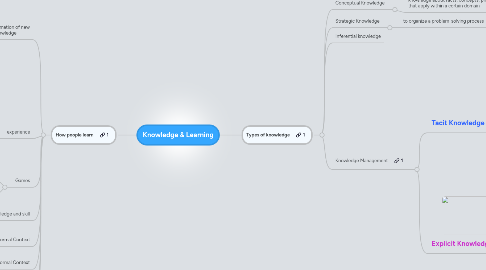
1. How people learn
1.1. formation of new knowledge
1.1.1. Visual/Spatial
1.1.2. Musical/Rhythmic
1.1.3. Bodily Kinesthetic
1.1.4. Verbal/Linguistic
1.1.4.1. from classroom teachers
1.1.5. Logical/Mathematical
1.1.6. Interpersonal/Intrapersonal intelligences
1.1.6.1. Self-Directed
1.1.6.1.1. reading
1.1.6.1.2. Research
1.1.6.2. peers learning
1.1.6.2.1. Problem Solving
1.1.6.2.2. discussion
1.2. experience
1.2.1. Trial & Error
1.2.1.1. what???
1.2.2. making mistakes
1.2.3. from others shared experience
1.2.4. Hands-on practice
1.3. Games
1.3.1. Role Play
1.3.2. Able to make mistakes and try again
1.4. Application of new knowledge and skill
1.4.1. analyzes, conceptualizes, and synthesizes
1.4.2. experience/prior knowledge creatively generating original work and innovative
1.5. Formal Context
1.5.1. Classroom
1.6. Informal Context
1.6.1. New Media's Applications
1.6.2. Social domain
1.7. By Observation
1.8. Apprenticeship
2. Types of knowledge
2.1. Conceptual Knowledge
2.1.1. knowledge about facts, concepts, principles that apply within a certain domain
2.2. Strategic Knowledge
2.2.1. to organize a problem-solving process
2.3. Inferential knowledge
2.4. Knowledge Management
2.4.1. Tacit Knowledge (Embodied Knowledge)
2.4.1.1. know-how (Brown & Duguid 1998)
2.4.1.2. depends on culture
2.4.1.3. depends on environment
2.4.1.4. Embedded Knowledge
2.4.1.4.1. locked in processes, products, culture, routines, artifacts, or structures (Horvath 2000, Gamble & Blackwell 2001). Also known as Tacit Knowledge
2.4.1.5. reflections
2.4.1.6. Largely experience-based & hard to define
2.4.1.7. Context-dependent
2.4.2. Explicit Knowledge
2.4.2.1. Declarative Knowledge
2.4.2.1.1. Factual Knowledge
2.4.2.2. Meta-Cognitive Knowledge
2.4.2.3. Procedural Knowledge
2.4.2.3.1. knowledge exercised in the performance of some task
2.4.2.3.2. skills
